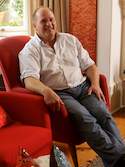Bruce Jack is the universal man of modern Cape winemaking. His intellectual curiosity and broad tastes have accepted no geographic or philosophical boundaries during his career as a winemaker: for him, wine, like life, is a journey, an adventure, and he is an easy and happy traveller.
Vintage 13

Bruce Jack grew up in Cape Town: in Muizenberg, where he learned to surf (and still does), and the southern suburbs, which remain his home. He and his wife Penny and their two boys live in a grand old Victorian lady: the original Kenilworth farmhouse dating back to the 1860s.
Bruce is the son of architect David Jack, a one-time Cape Town city planner and a founder of Cape Town's tourism mecca - the Victoria & Alfred Waterfront - and the late Elspeth Jack, a guitarist and lecturer at the University of Cape Town (UCT) South College of Music. 'In retrospect,' he says 'an eclectic, rather chaotic interest in the pursuit of the unusual was already obvious as a youngster back then.'
He earned pocket money as a schoolboy with an early morning newspaper round. At Diocesan College (Bishops) he captained the shooting team, was head sacristan and head librarian, and won the school art prize for three consecutive years. He also played rugby, later representing South Africa inside the U20 side (now called the Baby Boks) against Paraguay.
Pocket money also came from working as a shelf-packer in a neighbourhood liquor store, where a certain old English gentleman, a regular customer, was to tell him: 'Get into the drink, my boy; you're built for it.'
Such encounters and experiences seemed to pre-ordain the life of a man who came to believe the wine he made could be a divine form of communication.
Man of Letters
There was British playwright Alisdair Graeme Campbell. This 'generous and patient English teacher fed Bruce's abiding love of the written word during his post-matric year at Eton College, England, where he studied art, history of art, and creative writing.
The late Professor Stephen Watson, South African poet and essayist and Bruce's English lecturer at UCT, where he did his first degree in political science, English, and religion, 'inspired a newfound appreciation for academia'. It earned him a place at St Andrews University, Scotland, to read for a Master's degree in English literature.
There he studied under Scottish poet Douglas Dunn and coached the St Andrews University 1st XV (having previously coached at Bishops and UCT and refereed for the Western Province Referees' Association). 'Great fun, good parties, and some very decent rugby,' he remembers.
He was 'all ready to start writing the great South African novel' when he took a job with a wine company in Lincolnshire called South African Wine Imports, becoming heavily involved in the UK wine trade and then deciding to 'get into winemaking'.
 Scrambled eggs recipe by Bruce Jack paired with CWG Flagstone Weather Girl or CWG Flagstone Happy Hour wine....
Scrambled eggs recipe by Bruce Jack paired with CWG Flagstone Weather Girl or CWG Flagstone Happy Hour wine.... Shiitake mushroom, organic spinach, and kale risotto with gremolata and white truffle oil recipe by Bruce Jack....
Shiitake mushroom, organic spinach, and kale risotto with gremolata and white truffle oil recipe by Bruce Jack....